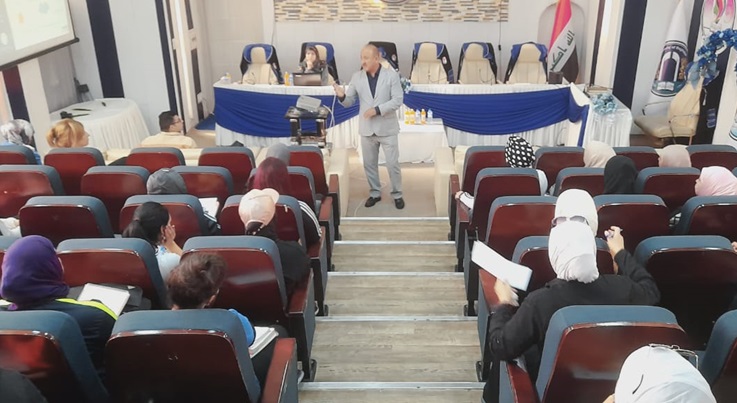The Media and Public Relations Unit and the Sustainable Development Committee at the College of Physical Education and Sports Sciences for Girls, University of Baghdad, under the patronage of its Dean, Prof. Dr. Fatima Abd Maleh, Ministry of Environment / Department of Environmental Awareness and Media, hosted the Head of the University Environment Department, Professor Riyadh Fadel Nassif, and the engineers, Ali Karim Shukr and Fatima Hussein Abd and the Ministry’s media figures, Shahad Faisal and photographer Wissam Salah, held awareness seminars within the sustainable development curriculum entitled (Climate Change and Water)
The symposium’s speaker, Mr. Riyadh , presented and explained the concept of climate as a noticeable change in its elements, such as the rates of temperature, precipitation, and winds. He pointed out its causes, namely severe drought, water scarcity, floods, extremely cold storms, forest fires, the melting of polar ice, and rising sea levels, noting that… Global warming is changes in rainfall and rising temperatures.
He stressed that there are five main aspects causing the water crisis in Iraq, which are: an aspect related to the sources of Iraq’s rivers being outside its borders, and thus the upstream countries control the water and build dams on it, environmental pollution due to the upstream countries dumping sewage and drainage water and the accompanying pesticides, chemical fertilizers, and heavy industrial waste, which It has a negative impact on the quality of water and its suitability for use in the downstream countries of Iraq, the large population growth that has become a major pressure on the available water resources that it will not be able to bear, and an administrative, economic and engineering aspect represented by the incorrect water management method in Iraq due to their reliance on the traditional method of irrigation with (seeding), which The amount of agricultural water consumption, which is 70% of the total water consumed, explains the natural aspect represented by climate change, as it is considered one of the most dangerous natural factors causing the water crisis, even if this crisis was originally caused by human causes.
He pointed out the most important harsh impacts of climate change, leading to societal threats that affect livelihood and individual health, the most important of which are security, water, food, environmental, and health threats.
At the conclusion of the symposium, the two sides awarded symbolic shields expressing their love for Iraq. At the same time, both parties praised the efforts made to cooperate to develop community awareness of water culture, its resources, and the extent of its importance in the life of the individual and society for the purpose of reducing environmental pollution.
This symposium achieves the sustainable development goals, represented by the sixth goal: clean water and sanitation, the thirteenth goal, climate action, and the seventeenth goal: establishing partnerships to achieve the goals.
